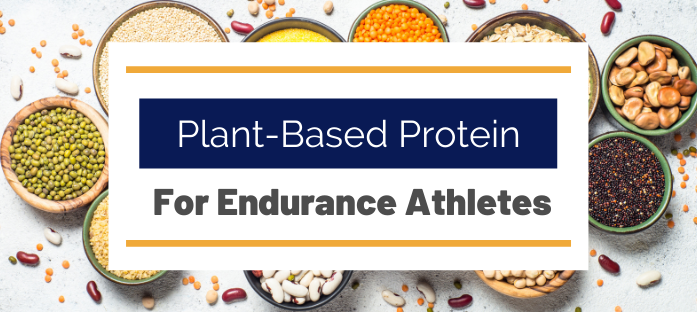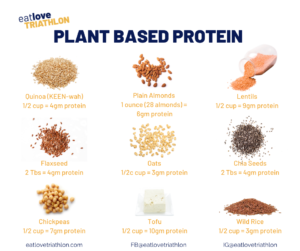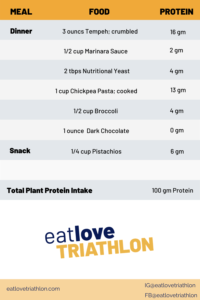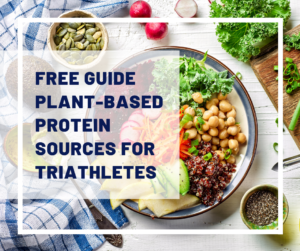

SHARE ON

Kathleen Oswalt | May 9, 2022
For those of you who want to go more plant-based, you can stop asking yourself “where am I going to get my protein from if I eat more plants?”.
Athlete, I’m going to answer that question for you so you can confidently fuel your body with plant-based protein and less animal protein as you create a more predominantly plant-based athlete diet.
First, Why Plant-Based?
Going predominantly plant-based has so many benefits not only for your body but also for the environment and animal well-being.
Eating more plants and a variety of plants has potential to improve heart health and therefore your overall performance, decrease inflammation and speed up recovery so you can tackle that next training session, keep your immune system strong and healthy so you don’t end up with the common cold everyone else has and plain and simple getting in tons of nutrients can help your body run like a well-oiled machine.
Overall, focusing on more whole foods and plants and less on processed foods and high fat animal products is a move in the right direction.
The Basics of Protein
What is protein and why do you need it?
There are 3 macronutrients that build a balanced diet, protein is one of them. Its main function is to build muscle mass and repair tissues in your body. Protein is made up of a variety of different sequences of amino acids or what we typically refer to as the “building blocks” of protein. There are 20 amino acids, 11 are considered “non-essential” and 9 are considered “essential”.
So, what does that mean?
It means that the body can make all 11 non-essential amino acids on its own. The other 9 essential amino acids must come from the foods you eat. Regardless, the body needs all 20. It’s been thought for some time that only animal protein provides good quality, complete protein that allows athletes to perform at the highest level, but these days that myth is being busted!
Athletes, the good news is, you can get non-essential amino acids from eating a variety of plants and still perform at high levels that allow you to cut your overall time, land on the podium and even send you to Kona!
How Much Protein Does an endurance athlete Need?
Have you ever wondered the answer to this question? Have you ever asked yourself or maybe fellow athletes “how much protein should I be eating?”.
Let’s look at this for a moment.
For the average healthy adult you’ll find the recommended daily allowance (RDA) for protein requirements at 0.8 grams/kilogram body mass but for endurance athletes this is too low. Current recommendations for athletes, like you, are far above the 0.8 grams/kg recommendations.
To build and repair the muscle tissues and fibers that are continually being broken down from training and racing, the current guidelines in a joint position paper on nutrition and athletic performance, suggest you’ll need anywhere between 1.2 – 2.0 grams protein/kilogram body mass. Depending on what your activity level looks like, this will dictate where you land on that scale.
So…wait. How do you figure all this out? What’s next?
You’ll take your body weight in pounds and divide by 2.2 to convert your body weight to kilograms. For example: 155 pounds/2.2 = 70kg (kilograms)
Next, you’ll multiply your body weight in kilograms by the amount of protein you need based on your activity level.
For example: 70kg x 1.2 – 2.0 grams protein = 84 – 140 grams protein per day
To calculate your nutrition needs and build a nutrition plan that best fits you, I recommend working with a registered dietitian to help you come up with the best personalized plan. If you’d like to set up an appointment to talk about how I can help build a personalized plan for you contact me today.
Plant-Based Protein and the Best Way to Meet Your Athlete Needs
If you read my very first blog; Why Your Athlete Diet Should Be Predominantly Plant-Based you now understand that eating plant-based is all about VARIETY!
A recent review article in Nutrients, Dietary Protein and Amino Acid in Vegetarian Diets – A Review, reminds us that plant foods can provide more than enough protein for the day. The problem that many see, with plants, is their amino acid makeup (remember, the building blocks that make up protein). Plant foods aren’t missing any amino acids but their amino acid profile is less optimal than their animal protein counterparts.
Now, don’t let that stop you from reading.
Plants not only vary in their micronutrient content but they vary in their amino acid makeup.
Some plant foods have more variety of amino acids and a higher content providing more bang for your buck. This is one big reason why variety can be so important for your predominantly plant-based diet.
Variety and adequate consumption of fuel are the 2 keys to meeting your daily protein needs with plants.
So, let’s get back to the question…“where am I going to get my protein from if I eat more plants?”.
Including plant-based protein foods like lentils, chickpeas, beans and peas, flaxseed and chia seeds and also grains like oats, quinoa, rice and farro will provide a nice balance of complementary amino acid profiles.
What does this mean?
It means when you include a variety of plant-based proteins in your diet, you’re likely to meet your daily protein needs without difficulty.

Remember, eating the same small groups of foods over and over, in the long run, can be less beneficial on your overall health and impede the ability to meet nutrient needs.
Okay, Plant-Based Protein; so now what?
Are you wondering how to put it all together? What does a day of protein requirements and intake look like for your triathlete diet? Are you feeling a little overwhelmed?
It’s like swim, bike, run; everything takes practice. The more you learn about eating plant-based and the more you actually eat plant-based the more it will become second nature.
Say goodbye to the overwhelm, let me show you how easy this can be.
For someone who weighs 75kg (165 pounds) and their protein requirement should be at 1.3gm/kg; the calculation tells us daily protein needs are going to be 97.5gm/day.
See the chart below for an example of how a day’s worth of food can provide enough protein to meet daily requirements. This is not including any added veggies to the salad at lunch/salad dressing etc.


So, what do you think? Can you see that if you choose food variety and properly fuel your body YOU CAN get enough plant protein into your diet to perform at high levels?
If you’ve been thinking about going more plant-based and want to make sure you’re getting in your protein, grab the free resource I put together for you.
Your Plant Based-Protein Sources, easy to follow, handout! It gives you a breakdown of several high protein plant foods along with ideas on how to incorporate them into your diet.
Lastly, get the support you might be looking for. Check out two other blog posts for a go-to plant-based shopping list OR ideas on plant-based snacks.
SHARE ON
8 Comments
Leave a Comment
UNLOCK YOUR ATHLETIC POTENTIAL
MEET YOUR POWER TEAM
Dietitian Kathleen and Kona-Qualifier Don Oswalt
Welcome to Eat Love Triathlon! We’re Don and Kathleen your go-to dietitian and triathlete. Together, we’re here to share our latest and greatest tips, with you, on how to be a well-balanced triathlete with nutrition, triathlon and keeping harmony in your relationships. We’re excited you’ve stopped by, happy reading and don’t be shy about reaching out. We’d love to hear from you!

[…] was a pot FULL of NUTRIENTS! The quinoa and beans provided carbohydrates and plant protein. The variety of vegetables provided fiber, vitamins and minerals and plant compounds like […]
Love the site– really user friendly and great deals to see!
[…] foods served up provided lots of carbohydrates, protein and healthy fats but also lots of vitamins, minerals, antioxidants, anti-inflammatories and fiber […]
[…] make up one of the three macronutrients. Protein and fat are the other two. These macronutrients are essential for your body to function. They’re […]
[…] bean packs a punch of plant-based protein. It also provides high quality carbohydrates, fiber, fat and […]
[…] a plant-based athlete, it’s essential to consume adequate protein to support muscle recovery and growth. Experts recommend endurance athletes consume at least […]
[…] constructing a balanced plant-based meal plan, focus on incorporating various sources of plant-based protein, carbohydrates, and fats, as well as vitamins and […]